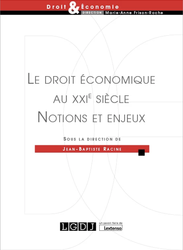Sept. 4, 2025
Thesaurus : Doctrine

► Full Reference: V. Magnier, "Transformation de la gouvernance et obligation de vigilance" (The transformation of governance and due diligence), in M.-A. Frison-Roche (dir.), L'Obligation de Compliance, Journal of Regulation & Compliance (JoRC) and Dalloz, coll. "Régulations & Compliance", 2024, forthcoming
____
📕read the general presentation of the book, L'Obligation de Compliance, in which this contribution is published
____
► English summary of this contribution (done by the Journal of Regulation & Compliance - JoRC) : The author develops the tensions caused by Compliance Law and the Duty of Vigilance on corporate governance.
The French "Sapin 2" law targets corruption, while the French "Vigilance" law has a broader scope in terms of risks and the entire value chain. It is logical that this should create tensions in terms of governance, given the monumental goals involved. Companies need to take ownership of the powers delegated to them, which means rethinking their governance and the way in which they exercise their corporate mandates, with the corporate interest, the judge's compass, having to be combined with the adoption of new standards of behaviour formalised voluntarily by ethical charters in line with international standards. On this voluntary and supervised basis, the company must adapt its structure and then contractualise these norms.
This ethical approach has an impact on the role of corporate organs, not only in terms of transparency and risk prioritisation, but also proactively in terms of the adoption of commitments whose sincerity will be verified, as reflected, for example, in corporate governance codes (cf.in France the AFEP-MEDEF Code), the setting up of ad hoc committees and the presence of stakeholders, who will be consulted when the vigilance plan is drawn up.
She stresses that this creates tensions, that dialogue is difficult, that business secrecy must be preserved, but that stakeholders must become Vigilance watchdogs, a role that should not be left to the public authorities alone.
____
🦉this article is available in full text pour the persons following the Professor Marie-Anne Frison-Roche teaching
________
May 5, 2021
Thesaurus : 08. Juridictions du fond
Référence complète : Paris, 5 mai 2021, Carrefour
____
La société Carrefour Hypermarchés commande et achète des produits référencés par sa centrale de référencement, Carrefour Marchandises Internationales (CMI), notamment ceux de la la société I2C. Or, le responsable du référencement des produits de cette société s'était vu offrir des voyages par ce fournisseur (certes avant l'établissement de la Charte éthique).
Un audit avait révélé cela après l'adoption de la charte. Par conséquent, la société CMI a mis fin à sa relation commerciale avec ce fournisseur.
Contestée sur l'allégation du caractère brutal de la rupture des relations commerciale, la Cour estime que cela est justifié car la violation de la charte éthique pouvait fonder la rupture immédiate des relations commerciales, indépendamment de leur date en raison de leur gravité.
- Voir dans le même rattachement à l'obligation de vigilance sur les manquements du fournisseur, justifiant la cessation immédiate de toutes relations commerciales :
- Paris, 13 mars 2019, Monoprix , n°17/21477 ;
- Paris, 24 mars 201, Promod, n°19/15565
________
Dec. 8, 2020
Thesaurus : Doctrine

► Référence complète : P. Deumier, "Les sources du droit économique", in J.-B. Racine (dir.), Le droit économique au XXIe siècle. Notions et enjeux, LGDJ, coll. "Droit & Économie", 2020, pp.24-37
____
📕consulter une présentation générale de l'ouvrage, Le droit économique au XXIe siècle. Notions et enjeux, dans lequel cet article est publié
____
► Résumé de l'article :
____
🦉Cet article est accessible en texte intégral pour les personnes inscrites aux enseignements de la Professeure Marie-Anne Frison-Roche
________
Dec. 24, 2019
MAFR TV : MAFR TV - case

Watch the video commenting on the decision of the Commission des sanctions of the Autorité des marchés financiers - AMF (French Financial Market Authority Sanctions Commission).
Read the decision.
_______________
In 2015, a document supposedly emanating from the Vinci company reached the Bloomberg media announcing unexpected catastrophic results. The two journalists who received it immediately published it without checking anything, the Vinci listed shares losing more than 18%. It was a rude forgery, which a basic check would have established, a check which the journalists had not done.
4 years later, the Bloomerg company is punished for the breach to "disseminate false information" on the financial market, by a decision of the Sanctions Commission of the Autorité des Marchés Financiers (French Financial Markets Authority) of December 11, 2019.
The company being sued argued that it was up to journalists to be accountable and not to itself, because on the contrary the firm had implemented both detection software and a code of conduct, even though there was no legal rule constraining it. In consequence, it would not possible to pursue it.
But the AMF Sanctions Commission stresses that, independently of this, it is a general rule of ethics for journalists that obliges them to verify the authenticity of the documents they publish, which they did not, whereas an elementary check would have allowed them to measure that it is a rude forgery.
In addition, the Sanctions Commission refers to the European Regulation on market abuses which in its article 21 targets the special status to be reserved for press freedom and the special status of journalists, but associates this ethical obligation to verify documents . However, the Sanctions Commission notes that this obligation, which was targeted by both the journalists' ethics and the reference text of Financial Law, was completely ignored by the two journalists. It is therefore up to the press agency to be accountable and to be punished.
However, the media entreprise maintained that the balance between the principle of freedom of the press and the principle of freedom of opinion on the one hand and the principle of the protection of the financial market and of investors against false information disseminated requires an interpretation of the European Union Law, which must oblige the Sanctions Commission to ask a preliminary question to the Court of Justice of the European Union.
The Sanctions Commission dismisses this request because it considers that the European texts are "clear", which allows the Sanctions Commission to interpret them itself. And precisely the European Regulation on market abuse in its article 21 provides for the exception in favor of the press and journalists but compels them to respect their ethics, in particular the verification of the authenticity of documents. In this case, they did nothing. They are clearly the authors of a breach attributable to the company.
________
In a less clear case, one could consider that this balance between two principles, both of public interest, is delicate and that an interpretation by the Court of Justice would always be useful.
Indeed and more fundamentally, does Financial Law remain an autonomous Law, putting first the objective of the preservation of the integration of the financial market and the protection of investors or is it the advanced point of an Information Law protecting everyone against the action of any "influencer" (category to which Bloomberg belongs) consisting in disseminating inaccurate information (notion of "misinformation")?
And that is not so "clear" ....
_____________________
March 10, 2016
Conferences

► Full Reference: M.-A. Frison-Roche, "Le Diable dans la bouteille des Codes de bonne conduite" (The Devil in the bottle of Codes of Conduct). Hommage to Gérard Farjat, Center of Economic Law, Nice, France, 10 March 2016 .
____
► see the conference . (in French)
► see the construction of this conference (in French)
► see the media/assets/slides/les-codes-de-bonne-conduite.pdf"> slides, used as basis for this conference (in French).
____
► English presentation of this conference: In 1978, our mutual friend Gérard Farjat wrote a memorable article on "les codes de conduite privés" ('private codes of conduct') (in French), codes of conduct which have since flourished. I remember that it worried him because he was aware of the rhetoric, and even the contradiction, that these codes contain, and at the same time he did not see what could stop this legitimate way for international companies to organise an 'order' at home, since the Law was no longer able to offer them one from the outside, nor was Law capable of limiting the less virtuous tendency of companies to fashion norms by which they exercise power not only to organise themselves but also to govern others and the outside world.
When Gérard Farjat wrote this article in 1978, Corporate Social Responsibility had not yet been conceived...
Have we reached the same point? Can we even say that the situation has worsened, with the world being "standardised" and "governed" by "global" companies that write and impose codes of "good" conduct that express what is "good" in itself and end up constituting veritable "global constitutions"?
No. In fact, the opposite is true. Through the power of Regulators and Supervisors, institutions of public authority, public standards are internalised in "global" companies, which repeat them in codes of conduct and become their own regulators and supervisors.
________
Feb. 1, 2012
Thesaurus : Doctrine
Référence complète : Murphy, J., How DG Competition and U.S. DOJ Antitrust Division Hurt Compliance Efforts, CPI Antitrust Chronicle, février 2012, n°1.
Les étudiants Sciences Po peuvent consulter l'article via le drive, dossier "MAFR - Régulation & Compliance"
Oct. 7, 2011
Thesaurus : Doctrine
Référence complète : Murphy, J., Roundtable on promoting compliance with competition law, OCDE (DAF/COMP), 2011, n°5.
Les étudiants Sciences Po peuvent consulter l'article via le drive, dossier "MAFR - Régulation & Compliance"
